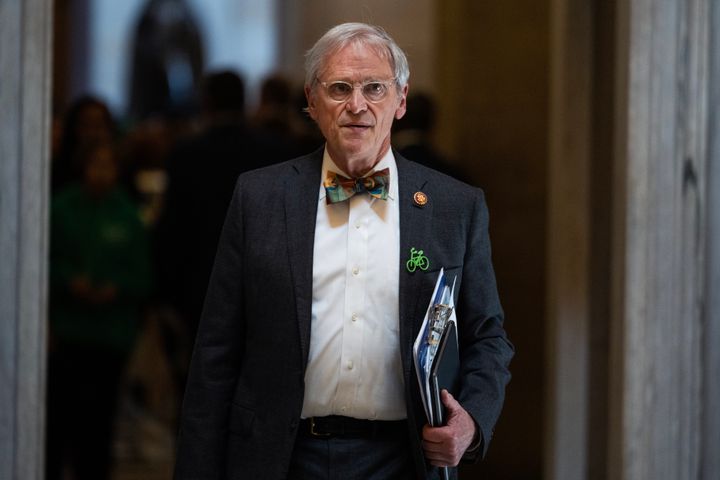WASHINGTON — Even as President Joe Biden’s administration is reconsidering the criminal classification of marijuana — an epic policy shift — they are dragging their feet on the much simpler question of researching the medical impact of cannabis.
Congress passed a law at the end of 2022 designed to make it easier for organizations such as universities to obtain cannabis and study its potential medical uses, an enterprise hobbled for years by marijuana’s illegality at the federal level.
Loosening restrictions on cannabis research was so obviously worthwhile that the law, sponsored by legalization-friendly Rep. Earl Blumenauer (D-Ore.) and prominent pot skeptic Rep. Andy Harris (R-Md.), passed the House by an overwhelming bipartisan vote of 325 to 95, and the Senate approved it without even bothering to count votes.
Blumenauer said that as far as he can tell, however, the administration has done nothing to streamline the process for approving cannabis research.
“It’s embarrassing,” Blumenauer, who is retiring at the end of this Congress, told HuffPost. “I’ve seen no evidence that they’re at work to make this research go much more smoothly. I mean, this not low-hanging fruit — this is picking it up off the ground. It just mystifies me.”
The law also required the Department of Health and Human Services to submit a report to Congress detailing “the potential therapeutic effects of cannabidiol or marijuana on serious medical conditions,” the effects of marijuana on “on the human body and developing adolescent brains,” and barriers to research in states that have legalized marijuana.
The Medical Marijuana and Cannabidiol Research Expansion Act, enacted in December 2022, gave HHS a year to submit its report, but the department has yet to do so. Blumenauer and Harris complained about the blown deadline and the continued research obstacles in a March letter to agency heads but received no response.

Spokespeople for HHS did not respond to requests for comment. Spokespeople for the White House and the Drug Enforcement Administration, required by the law to simplify procedures for registering pot researchers and manufacturers, also did not respond to requests for comment.
The Biden administration has undertaken a historic review of whether marijuana belongs in the same category of illegal drugs as heroin and LSD, with The Associated Press reporting this week the DEA would reclassify cannabis as a less dangerous substance, stopping short of legalizing it.
The move to “reschedule” marijuana under the Controlled Substances Act represents an effort by the federal government to catch up to public opinion on marijuana, which a majority of Americans say should be legal for medical and recreational purposes, and which a majority of states have legalized for one or the other.
At the same time, Blumenauer said, the government’s apparent refusal to give greater leeway to researchers shows the bureaucratic inertia against a more enlightened view of cannabis.
“That’s part of the bureaucracy with the failed War on Drugs. They’re so invested in hurdles and problems,” Blumenauer said. “It’s extraordinarily frustrating, and it’s a symbol of what’s wrong with federal cannabis policy.”
Republicans in Congress have refused to go along with Democratic efforts to legalize weed, but medical marijuana remains a political middle ground. That’s why Harris, who has blocked the Washington, D.C., government’s efforts to set up a regulated marijuana industry in the capital city, was willing to do the research bill. He said he was “deeply disappointed” that the law had not been implemented in line with congressional intent.
“While there is evidence to suggest that medical marijuana may be beneficial in the treatment of some diseases like glaucoma and epilepsy, only scientific research will prove the veracity of the many claims regarding efficacy for other diseases,” Harris said.
Conducting clinical trials to measure the efficacy of marijuana as a medical treatment requires approvals from HHS and the DEA, which the agencies have refused to grant even in cases where state governments have funded studies into the potential benefits of cannabis for military veterans.
Paul Armentano, deputy director of the National Organization for the Reform of Marijuana Laws, said the Blumenauer-Harris law has had no noticeable impact on the marijuana research landscape. He faulted the law itself for adding a requirement the U.S. attorney general sign off on research applications.
“Unfortunately, while I think some folks were acting in good faith when they were supporting that bill, it was so watered-down by the end that I was not convinced it was going to lead to any significant major changes, and I don’t think today it has,” Armentano said.
Armentano also noted, however, that a lot is already known about the effects of cannabis on the human body, including through a plethora of observational studies. The National Academy of Sciences reported in 2017, for instance, that there’s strong evidence cannabis can relieve chemotherapy-induced nausea in cancer patients and that there’s no statistical association between cannabis use and lung cancer.
The Biden administration’s dramatic move to reschedule marijuana likely won’t open the door to new research, but Betty Aldworth, with the Multidisciplinary Association for Psychedelic Studies, which has sought to conduct a clinical trial with inhaled marijuana and veterans, said the change could be a useful signal.
“Recategorizing of cannabis could prompt certain bureaucracies and bureaucrats to look at processes and restrictions and begin to take action toward removing barriers for patients and consumers in terms of clinical research,” Aldworth said. “I certainly hope that that’s the case.”
CORRECTION: An earlier version of this article incorrectly reported the federal government lists cocaine is in the same category of controlled substances as marijuana; cocaine is actually in a category for less dangerous substances.
Disclaimer: The copyright of this article belongs to the original author. Reposting this article is solely for the purpose of information dissemination and does not constitute any investment advice. If there is any infringement, please contact us immediately. We will make corrections or deletions as necessary. Thank you.
